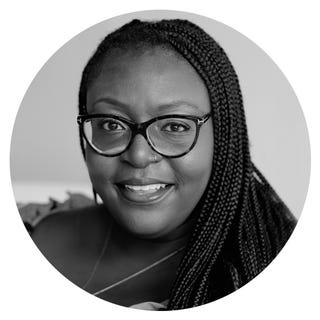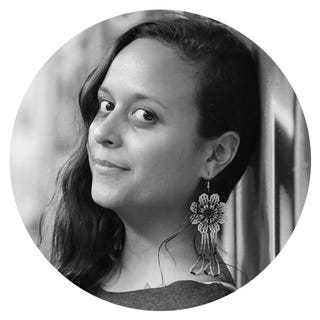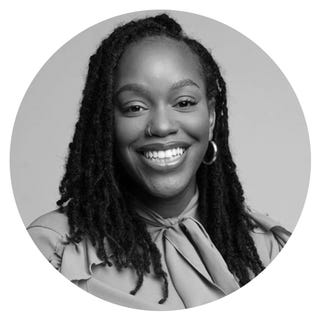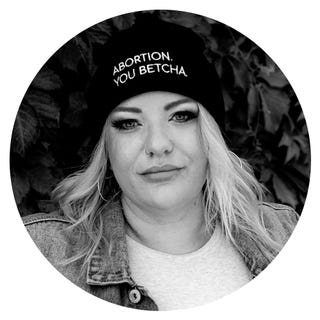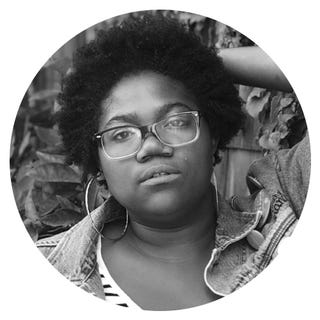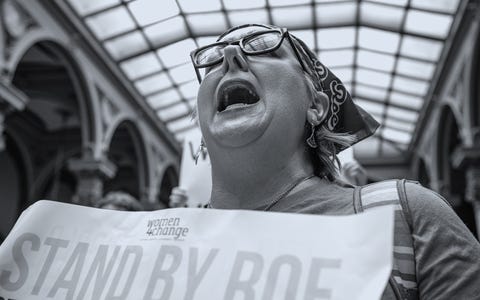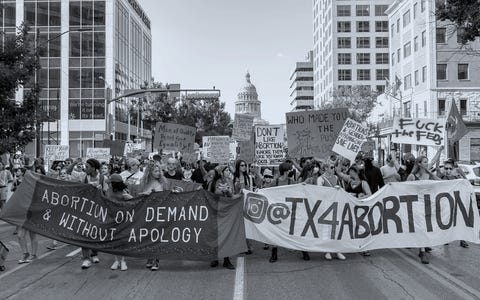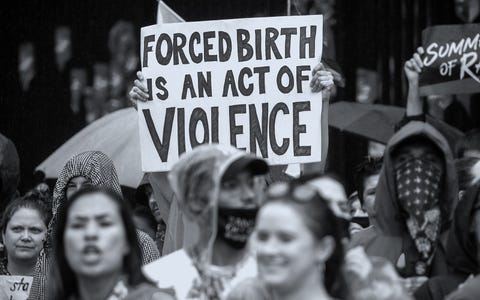Products You May Like
In the three months since the Supreme Court overturned Roe v. Wade, 14 states have banned nearly all abortions, causing millions of people to lose access. As a result, patients—including pregnant people with cancer and underage rape victims—have been denied medical services. Many are forced to travel across the country, navigate a patchwork of confusing state-level policy, and spend thousands of dollars just to receive care.
Often behind these stories is the essential work of abortion funds, which assist people who can’t access abortion by providing funds for the procedure as well as the logistical support necessary to obtain an abortion, including lodging, travel, and child care. For the leaders who oversee and work with these funds, this past summer was grueling and mercurial, yet in many ways still hopeful. Earlier this month, ELLE.com gathered five of these leaders on Zoom for a roundtable discussion about how their work has been affected, what they’re hearing from patients on the ground, and why, as one leader says, eliminating Roe means that it’s time to reach for a bigger goal: free and accessible abortion care for all.
The Leaders
Oriaku Njoku, executive director of the National Network of Abortion Funds
NNAF is a member organization with a network of nearly 100 abortion funds.
Amanda Beatriz Williams, executive director of the Lilith Fund
The Lilith Fund is based in Texas, where those who “aid or abet” abortions are subject to penalties. As a result, Lilith has discontinued funding abortions and has shifted to offering financial assistance for ultrasounds, birth control, and other reproductive health care services.
Jalessah Jackson, interim executive director of Access Reproductive Care-Southeast
ARC-Southeast supports patients in Alabama, Mississippi, and Tennessee, where most or all abortions are banned; Georgia, where abortion is banned after six weeks of pregnancy; South Carolina, where a six-week ban has been temporarily blocked; and Florida, where abortion is banned after 15 weeks of pregnancy.
Destini Spaeth, president of the North Dakota Women in Need Abortion Access Fund
The ND WIN Fund supports those in North Dakota, where a judge temporarily blocked a ban on nearly all abortions. In preparation for Roe’s reversal, the state’s sole abortion clinic moved a five-minute drive away to Minnesota.
Javay Frye-Nekrasova, board member of the Northwest Abortion Access Fund
The NAAF Fund serves those in Washington, Oregon, and Alaska, where abortion is legal, and Idaho, where nearly all abortions are banned.
Where were you when you got the news about Roe being overturned, and what immediate actions did you take?
Amanda Beatriz Williams, Lilith Fund: My friend is an abortion provider who lives in Houston, and we were together, because we were going to the Houston Pride events. We’re a bunch of queer people of color, and we were going to have a great night. We were going to go dancing. But instead, we got this news. Of course, I had to do press events and shift into work mode. But at the end of it, we were still with our community. We were like, “We’re not going to let them steal our joy. It’s Pride. We cannot let them take that from us.” It was absolutely devastating. We cried. But we had to jump back on our feet, celebrate what it is that makes us human, and be in community the best we knew how.
Javay Frye-Nekrasova, Northwest Abortion Access Fund: I was at home when I saw it. Initially, I wanted to shut down. But then I remembered, that’s what they want. And that’s not going to work. So I checked in with people. The defeat you feel can be so paralyzing that I wanted to make sure everybody knew: “Hey, it may be shitty, but we don’t just roll over and take it. We’re not pillow princesses when it comes to our government. We’re going to fight back.” On the [fund] side, it was like, we’ve got to put the messaging out. We’ve got to stay on top of it. There are more people turning to us now. There’s a role to play, and we have to continue to play it.
We had to jump back on our feet, celebrate what it is that makes us human, and be in community the best we knew how.”
Destini Spaeth, ND WIN Fund: I was also alone when I found out. I’m pretty sure Twitter told me. I sat with that for about 30 seconds and then went into mobilization mode. We had one abortion clinic here in North Dakota. They’ve since moved, but I went there to be with my people and start gathering supplies. We had a rally at the courthouse. I was in the mode of: this is when we educate. This is when we give people the tools that are necessary to support this work and support people seeking abortions.
Jalessah Jackson, ARC-Southeast: About a week before Roe came down, I started in this position at ARC. It was a convergence at this very particular time, which felt both overwhelming and divine; it felt like reassurance from my ancestors that now is the time to boot up and really lean in. As a fire sign, the first emotion I felt was anger. I like to return to movement leaders, revolutionaries, and people who have done so much in alignment with the Black radical tradition and have written about their experiences. Going back to those writings, poems, videos is something that grounds me. So after the cussing fit I had, I read Audre Lorde’s “The Uses of Anger.” In our society, anger is something that’s frowned upon. People oftentimes associate anger as being the antithesis of logic. I don’t believe in that dichotomous way of thinking. So, really thinking about how we can use our anger in this moment toward our objectives.
Oriaku Njoku, National Network of Abortion Funds: I was here in my apartment by myself, and I meditated. I was like, this is actually the moment where we need to be grounded. It feels like it’s the default to have this sense of urgency, respond, respond, respond. It’s easy to catastrophize this situation we’re in. The thing that’s harder—but it’s the thing that guides me—is [asking], what is the future we’re actually fighting for? What steps do we need to take for our collective liberation? Really understanding and believing that collective liberation is a manifestation of our love. So what does that mean now for how we show up differently in movement, how we strategize, and the rigor required to work together? It’s the beginning of something new. It’s an opportunity to move forward and not have to be on the defense all the time. And at the same time, it’s a shitty-ass situation.
The state-level response has been swift and brutal. It’s changing day by day, and it’s difficult to keep up with. What has it been like to navigate the changing legal landscapes in your states?
Javay Frye-Nekrasova, Northwest Abortion Access Fund: We have to keep an awareness of what’s happening in all the states, especially the states that we serve. The education piece on our part increases. Unless you are a lawyer, unless you have that background of policy, half the stuff doesn’t make sense. You can read all the bills, and you’re still like, “So what can I do?” We have to understand it for ourselves, but then be able to relay that information so the callers and people reaching out to us for resources understand, too.
Amanda Beatriz Williams, Lilith Fund: In Texas, before Roe was overturned, we were already living in a state with the harshest abortion ban in the country. SB 8 was enacted in September of last year, which banned abortion at six weeks and also had a cause of action provision, which meant we were under threat of civil liability constantly. People were confused. It is so difficult, for even the most expert advocates, to keep up with the level of restrictions in our state. It’s not even that attorneys don’t always understand, it’s that they don’t always agree on the interpretation of the law. ’Cause guess what? These decisions, the statutes, they’re not meant to be easily understood. It’s up to interpretation, which is a huge problem when we’re talking about criminal and civil risk—whether or not we can interpret the law could mean going to prison or not. That is literally what’s at stake now.
Whether or not we can interpret the law could mean going to prison or not. That is literally what’s at stake now.”
Our fund is a majority women of color organization, and we have to think carefully about risk. What we’re hearing from patients is just this confusion, this isolation. We have to be clear as best we can and offer First Amendment-protected information, because the state has long since abandoned them. It’s been a nightmare. We’re plaintiffs in, like, a dozen lawsuits. But at the end of the day, we’re doing every single thing we possibly can. We’re fighting for a fighting chance. And it’s all we got.
Oriaku Njoku, National Network of Abortion Funds: When the six-week ban went into effect here in Georgia, my sister was working in clinic, and she called me like, “Is this real?” I’m looking, reading, and I’m like, “Oh my God. They actually went through with this.” It was really emotional, because they were in clinic as it happened, and it was supposed to go into effect immediately. There is such a huge disruption in service provision when things just pop up whenever they want. We know we can’t ever rely on the state or the courts to support us in our livelihood, because the laws and systems created were never intended for us. So [I’m] not surprised that it happened, but it was wild.
Jalessah Jackson, ARC-Southeast: What was really shocking [about Georgia] was that the judges decided to make it effective immediately, and that was an autonomous decision they made without being prompted by the state. That just communicates the commitment to state repression at multiple levels of our governments, not just in Georgia. It was a reminder that we can’t anticipate things to operate procedurally how we expect them to, or how they have before when our opposition is ensuring they have their representatives on the bench at multiple levels of state government. In Georgia, it looked like immediately calling people who had appointments for the very next day and having to hear those people’s concerns in real time, many of whom were already coming to Georgia from other states. So, needing to be rerouted again, which places an undue burden on so many of our callers, the majority of whom are Black and already parents. It was really hard for our team to make those calls.
Is there anything you feel hasn’t been talked about enough in regards to what patients have been facing since June?
Amanda Beatriz Williams, Lilith Fund: Hearing everyone talk about the states they’re serving, it struck me how critical it is that we pay attention in other states. Each time another state falls, it makes it so much worse for Texans. Right now, the only state that borders Texas where people can go is New Mexico, and from my service area, that’s at least a 10-hour drive. At this point in time, we have got to acknowledge how interconnected this fight truly is. This is now all of us or none of us. Our rights depend on each other.
We have got to acknowledge how interconnected this fight truly is. This is now all of us or none of us. Our rights depend on each other.”
Destini Spaeth, ND WIN Fund: WIN Fund does practical support, logistical support, whatever callers need leading up to and on the day of their appointment. On the day of their appointment, they’re seeing a medical professional, and if they want to leave with a birth control option, but money is a barrier, the WIN Fund will cover those costs. We’ve seen a four-time increase in requests for birth control coverage from January to June. I’m so happy that the WIN Fund is there to be that bridge, but at the same time, this decision to find a LARC [long-acting reversible contraception] or a birth control option feels almost coercive in nature. It’s not like birth control is being pushed four times harder, but it’s because of the restrictions for care and the uncertainty behind it. So it’s a bit grim to me that people are going that direction if it’s not something they’re going into with their whole heart.
Jalessah Jackson, ARC-Southeast: This is all also happening before the backdrop of abysmal maternal mortality rates. So there’s the compounded fear of carrying a pregnancy to term. And the constant lingering threat of criminalization—Am I able to legally access an abortion? Will I get in trouble for crossing state lines? Am I breaking a law?—partially stoked by media misrepresentations or sensationalism ends up creating an additional barrier to our people accessing care and is a form of psychological violence. The attacks on abortion access are on the service itself, it’s on the communities we help access that care, and it’s a coercive power tactic to keep people in place. I don’t want to miss out on the psychological impacts that surround the questions of legality that limit our willingness and ability to seek out the services that we need.
Where are you all finding hope and joy these days?
Destini Spaeth, ND WIN Fund: Roe is gone. Now we have the opportunity to start from the ground up. We know what our demands are, and we don’t have to stop at Roe. We’ll continue to expand, and make it bigger and better. Accessible, free care for everybody—that is the ultimate goal.
Roe is gone. Now we have the opportunity to start from the ground up.”
Oriaku Njoku, National Network of Abortion Funds: I have a lot of hope and so much joy in doing this work. Even the joy in resistance. The joy in seeing abortion funds thrive. The joy in knowing someone was able to get to their appointment, regardless of what legal and political climate we’re in. The other thing that gives me hope is that folks are starting to think beyond a binary choice. It’s not just having an abortion or not having an abortion. Reproductive justice is about having an abortion and all of the other issues that influence our decision-making process every day. Folks being able to see what’s happening with abortion access with an intersectional lens, being able to see that race, class, gender, the economy, access to jobs, labor rights, all of these things are tied into how people can get their abortions. I feel like people are starting to understand that. And that’s exciting. To me, that’s this radical love coming together to be like, we actually can change our future. We are in control of our own destinies. So, in this moment, what can we do to come together?
This interview has been edited and condensed.
Madison is a senior writer/editor at ELLE.com, covering news, politics, and culture. When she’s not on the internet, you can most likely find her taking a nap or eating banana bread.
